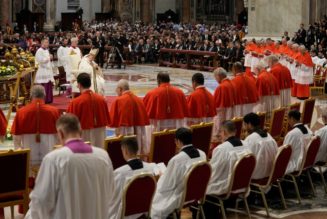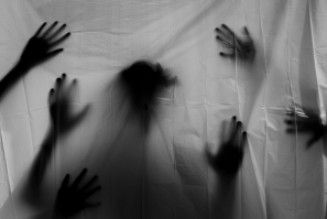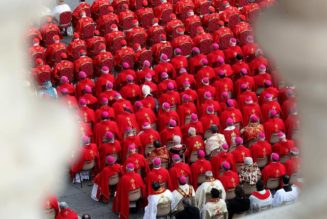By Dr. Jeff Mirus ( bio – articles – email ) | Oct 22, 2021
Sometimes we catch an unconfused glimpse of reality here on earth, though I admit this is rare. For example, an occasional news story, appearing at precisely the right moment, can speak volumes about the state of the world. Usually we find this in accounts of unprecedented evils which are not even recognized as evils by those doing the reporting. But occasionally a clear-headed report actually rises to the top. Sometimes the impact is subtle; sometimes not.
For example, a friend called my attention to The Daily Wire’s report on Vladimir Putin’s warnings about how “wokeness” is destroying the West. Certainly Putin, who is the President of Russia, has no love for the West and every psychological reason to be critical. But what is so fascinating is that he compares Western “wokeness” to Communist ideology.
Déjà vu all over again
Putin sees the deliberate reshaping of the human conscience, through an infinitely malleable secularized vision of social progress, as an unmitigated disaster. He ought to, since he experienced it first hand in the Soviet Union. For what we are dealing with now in the West is ideology pure and simple. Consider Putin’s remarkable indictment, which is well worth quoting at length:
The makers of so-called social progress believe they are bringing a new conscience, a new consciousness to humanity, something that is more correct. But there is one thing I would like to say:
The recipes they come up with are nothing new. Paradoxical as it may seem, this is something we saw in Russia. It happened in our country: After the 1917 revolution, the Bolsheviks followed the dogmas of Marx and Engels. And they also declared that they would change the traditional lifestyle, the political, the economic lifestyle, as well as the very notion of morality, the basic principles for a healthy society. They were trying to destroy age-long values, revisiting the relationship between the people. They were encouraging informing on one’s own beloved and families. This was hailed as the march of progress. And it was very popular across the world and it was supported by many; as we see, it is happening right now.
The Bolsheviks were absolutely intolerant of other opinions. As we see what is happening in the Western countries, it is with puzzlement that we see the practices Russia used to have and that we left behind. The fight for equality and against discrimination turns into an aggressive dogmatism on the brink of absurdity, when great authors of the past such as Shakespeare are no longer taught in schools and universities because they announced as backward classics that did not understand the importance of gender or race.
The Bolsheviks were speaking about nationalizing not just the property, but also women. The proponents of new approaches go so far that they want to eliminate the whole notion of men and women—and those who dare say that men and women exist and this is a biological fact, they are all but banished. Parent number one, parent number two, or the parent that has given birth, or instead of breast milk, you say human milk. And you say all of that, so the people who are not sure of their sexual agenda are not unhappy.
And I would like to say that this is not something new. In the 1920s, the Soviets…came up with the so called “Newspeak”, and they thought that thereby they were building a new consciousness and coming up with new values, and they went so far that we feel the consequences up until now. There are some monstrous things when, from a very young age, you teach children that the boy can easily become a girl and you impose on them this selection, this choice. You push the parents aside and make the children take this decision that can destroy their lives. And if we call the spade a spade, this is nigh to crime against humanity—and all of that under the banner of progress!
Now I do not endorse everything about Vladimir Putin, and of course it is always easier to see the speck in the other fellow’s eye. But where I live, we have to try to see the speck around a log.
Speaking of ideology…and of synods
Anyway, I have a second example. If you thought the synods of bishops over the past fifty years have been significantly impeded by bishops and theologians influenced by the West’s ideological secularism…. And if you saw much of this come to a head in the public gestures surrounding the last synod, on the Amazon…. And if you are appalled by the ideological use of “synodal paths” to dissolve even the teachings of Christ into the “woke” cultural stew…. Well, then, I’ve got just the news story for you: Archbishop opts out of Synod process. (I also recommend you click through to the original more detailed story to which our editorial team points.)
So can anything good come out of Naz…er, I mean, Liechtenstein? Archbishop Wolfgang Haas, who heads the sole diocese of this German-speaking microstate (between Austria and Switzerland), announced that his diocese will not participate in the prolonged consultative procedures prescribed for the next Synod of Bishops: “I am of the opinion that in our small archdiocese it is possible for good reasons to refrain from carrying out such a complex and sometimes even complicated procedure, which in our case runs the risk of” (wait for it) “becoming ideological.”
Now imagine that! I had already observed in my commentary of September 8th, Synodality and the evasion of responsibility, that:
A lot of the energy at and around each Synod, including the news coverage, seems to be directed by a desire to change the Church to make her more compatible with the world, rather than converting the world to Christ. On the whole, I would say it is not clear whether the synods have been more a burden or a blessing to the laity, or to the bishops themselves.
I do not know Archbishop Haas personally; nor do I know his track record as a bishop. Quite apart from ideological concerns, he also argues persuasively that in such a small, close-knit diocese as his own, there is little need for a whole raft of formal procedures to facilitate helpful communication. But assuming he is not at all disingenuous in the primary reason he gave for his non-participation in the elaborate pre-synod processes, this may make him the first bishop to “just say no” for all the right reasons—to recognize, in fact, that such consultative methods are easily subjected to manipulation. After all, several of the past general and special synods in Rome have given ample cause for alarm, and the most publicized “synodal path”—in nearby Germany—has been, from every legitimately Catholic point of view, an unprecedented disaster.
So Archbishop Haas’ decision sounds like the result of something that is exceedingly rare in this year of Our Lord 2021: clear Catholic thinking. Bishops are not bound, in their own dioceses, by every word that comes out of the mouths of Vatican offices. Moreover, they can prescind from even the universal disciplinary instructions of the pope if they deem them harmful to the spiritual good of the faithful in their own dioceses. Certainly the pope can override this by specific instructions to that bishop, or even by removing that bishop. Nonetheless, the principle is sound that, while the pope has the final word through his jurisdiction over the whole Church, each bishop also has his own true responsibility to adjust the general discipline for the good of souls in the particular circumstances of his own diocese.
Precedents or temptations?
There is no future, obviously, in living by every word that proceeds from the mouth of Vladimir Putin. Rather, Christ with me, Christ before me, Christ behind me, Christ in me, Christ beneath me, Christ above me, Christ on my right, Christ on my left, Christ in the heart of every man who speaks of me. So give me the sacraments of the Church to connect me with Christ; and the magisterial teachings of the Church to keep me focused on Christ.
Nor is it likely that the whole Church will follow the example of the Archdiocese of Vaduz which comprises the microstate of Liechtenstein—total population 38,000; Catholic population 28,000; a very wealthy tax haven; and a single archdiocese for the entire country. It could be argued, after all, that Archbishop Haas’ patch is atypical.
But it does sound like the silly train was deliberately derailed in Vaduz, an unusual location which just might offer the occasional glimpse of reality. So while you may not wish to move to Russia, doesn’t Liechtenstein sound tempting?
Sound Off! CatholicCulture.org supporters weigh in.
All comments are moderated. To lighten our editing burden, only current donors are allowed to Sound Off. If you are a current donor, log in to see the comment form; otherwise please support our work, and Sound Off!

Join Our Telegram Group : Salvation & Prosperity











